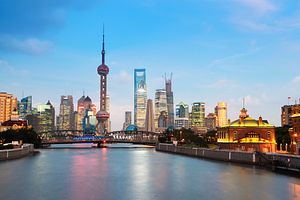In 2015 Chinese companies announced a record volume of outbound mergers and acquisitions (M&A) that came in north of $100 billion per annum for the very first time. Chinese dealmakers have rung in the New Year by picking up right where they had left off in 2015 and have announced two – in one case quite literally – blockbuster deals: Dalian Wanda Group’s $3.5 billion acquisition of Legendary Entertainment, the co-financier of Godzilla and Jurassic World, and Haier Group’s $5.4 billion take-over of GE’s iconic home appliances business. However, among deals announced since the beginning of the year, it might be China National Chemical Corporation’s acquisition of Germany’s KraussMaffei Group that is most interesting in terms of its potentially standard-setting impact on future deal structures, despite its smaller transaction volume.
ChemChina: Serial Acquirer
China National Chemical Corporation, widely known as ChemChina, is active in advanced chemical materials, basic chemicals, oil processing, agrochemicals, tire and rubber products, and chemical equipment. It is the largest company in China’s chemical industry, ranks among the largest state-owned enterprises in China, and was listed as 265th in the current Fortune Global 500.
Among China’s state-owned enterprises, ChemChina is one of the most active players in the global market for corporate control and has been a serial acquirer since 2006. In that year alone, ChemChina entered into three cross-border acquisitions. In 2015, it agreed to its largest outbound M&A deal so far: The acquisition of majority control of Italy’s Pirelli, one of the world’s leading tire manufacturers.
ChemChina has also made a bid for Syngenta, a Swiss pesticide and seeds conglomerate, which values Syngenta at around $44 billion. Should ChemChina succeed in completing this deal, it would very likely be the largest outbound M&A transaction made so far by any Chinese state-owned or private enterprise.
Earlier this month, a ChemChina-led consortium announced that it has entered into an agreement to take over Germany’s KraussMaffei Group, a globally leading manufacturer of plastics and rubber machinery. KraussMaffei Group is not to be confused with KMW Krauss-Maffei Wegmann, the manufacturer of Germany’s renowned Leopard 2 main battle tank. The two share historical roots but are separate, unrelated companies.
ChemChina announced that it will acquire KraussMaffei Group from its current owner, the Canadian buyout firm Onex Corp., for €925 million ($1 billion). Subject to closing, this deal would be largest transaction involving a Chinese acquirer and a German target after Sany’s 2012 purchase of concrete pump manufacturer Putzmeister. KraussMaffei Group’s work council and IG Metall, one of Germany’s largest labor unions, have welcomed the take-over and ChemChina’s long-term strategy for KraussMaffei Group.
On the buy side, ChemChina was joined by two co-investors: Guoxin International Investment Corp. and, most interestingly, AGIC Capital. AGIC Capital is a recently formed private equity firm that has strong roots both in China and in Germany. It was founded in 2015 by Henry Cai, a former senior UBS and Deutsche Bank investment banking executive and one of the most prominent dealmakers in Asia. AGIC Capital seeks to serve as a bridge between small- and medium-sized European companies and Asian markets and focuses on European industrial technology investments.
Implications for China’s Outbound M&A Deals
Despite the impressive development of China’s outbound M&A over the past years and the crossing of the $100 billion annual deal volume threshold last year, in a sense, Chinese corporate acquirers have actually underperformed in cross-border M&A deals relative to their potential. In many cases, Chinese acquirers have been handicapped by their lack of deal structuring and execution experience and expertise. These limitations have been particularly pernicious when Chinese companies had to compete in contested M&A bids against non-Chinese rivals.
In the recent past, Chinese private equity firms have become a force to be reckoned with in their own right. However, partnerships between Chinese state-owned enterprises and private equity firms such as the ChemChina and AGIC Capital tag team are still relatively rare. Given that top-notch private equity firms and their dealmakers can bring to the table the very deal structuring and execution experience and expertise that many Chinese industrial companies lack, teaming up with private equity firms as co-investors could be a logical force multiplier for potential Chinese acquirers.
The partnership of ChemChina and AGIC Capital to acquire KraussMaffei Group is particularly instructive as ChemChina is by no means a novice in the global M&A space. However, despite its relatively rich experience as a serial acquirer, ChemChina still sees value in teaming up with a private equity firm and its dealmakers. In fact, AGIC Capital’s involvement is credited with ChemChina’s ability to put together the deal in a relatively short period of time.
This winning team of an industrial company and a private equity firm might become a game-changing model for future outbound M&A, making Chinese companies even more formidable acquirers than they have been already.
Marc Szepan is a corporate executive currently on academic sabbatical at the University of Oxford where he is a doctoral candidate at Saïd Business School and a member of Green Templeton College. He is also affiliated with the Mercator Institute for China Studies, Berlin, Germany, as Senior Policy Fellow for China’s Political Economy. The views expressed in this article solely reflect his personal opinion.

































